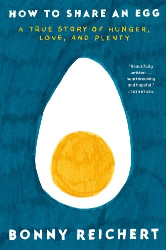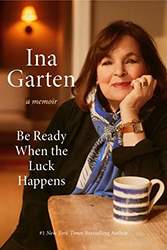As its meaty title suggests, My Mother’s Kitchen: Breakfast, Lunch, Dinner, and the Meaning of Life by Peter Gethers, is more than one story. The heart of the book is a tribute to the author’s mother, Judy Gethers, an accomplished home cook who became a professional chef later in life. The book is both a catalog of Judy’s favorite meals, which Peter tries to master and make for her, as well as Peter’s personal food memoir.
Gethers says his mother can deconstruct any meal, name its ingredients, and then make the dish again from scratch. She chops vegetables with graceful dexterity, checks food for the right texture, remembers recipes from years ago, and offers politely stated but honest critiques. Peter makes potatoes that are “lumpy’ but “delicious.”
Judy likes to eat. She likes simple American Jewish staples like matzo brei (matzah with fried eggs) as once served at Ratner’s, the kosher New York deli founded by her father in 1905. Peter likes making the dish, which he calls Hebraic French toast, for his mother. “As good as I remember it,” she says, “Authentic.” That positive review, he says, makes him feel authentic as well.
Judy also likes fancy, non-Jewish food, such as quail and fava bean puree. The book’s recipes vary widely in complexity. Gethers offers humorous, though sometimes strained, sidebar comments. “Squishing is my word,” he writes in all capital letters about a recipe for mashed potatoes.
At age fifty-three, Judy started her career as a part-time, unpaid cook. She quickly evolved into a French chef, an instructor who worked with Julia Child, and cookbook author. She mentored newcomer chefs, earning her the moniker “The Ma of Ma Maison,” the Los Angeles restaurant where Wolfgang Puck’s career blossomed.
Food and cooking sustain Judy Gethers. After receiving a cancer diagnosis and being told she wouldn’t be able to eat, she defied that medical assessment and consumed half a pastrami sandwich. With mustard and pickles.
Gethers clearly knows a lot about food preparation (he has edited cookbooks) but professes not to be a good cook, makes distracting self-deprecating remarks, and claims he cannot perform even certain simple tasks. His mother gives him a remedial lesson on how to crack an egg.
When he makes the chocolate pudding he loved as a child for his mother, she eats it directly from the warm pot just as he did. He enjoyed the pudding as a ten-year-old, she enjoys it now as an older woman, and both realize the pleasure each has given the other.
These shared food memories make the book worth reading.




